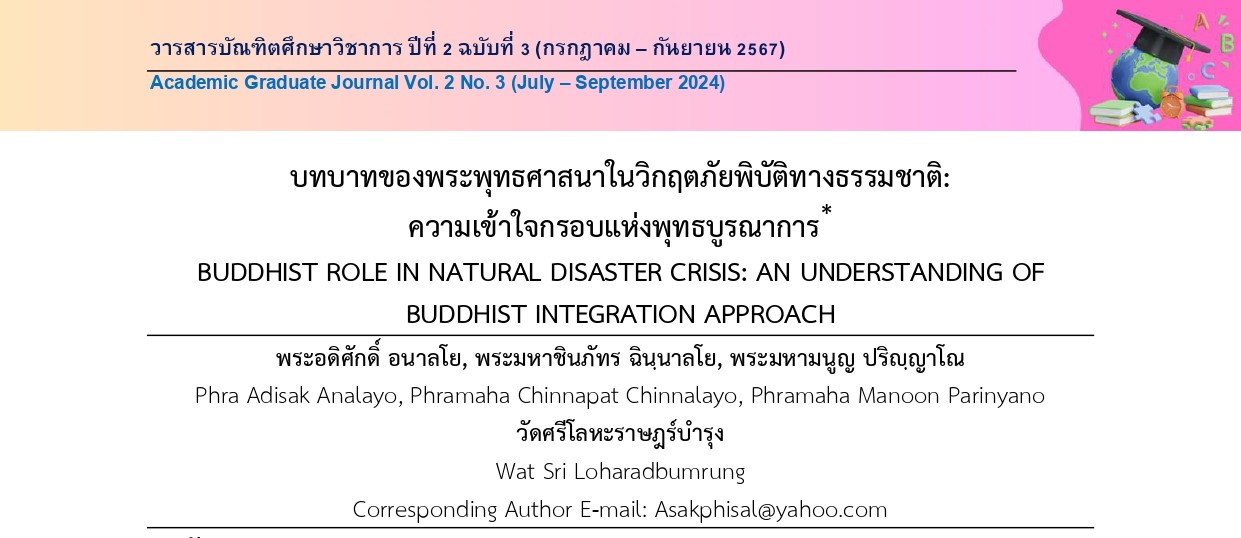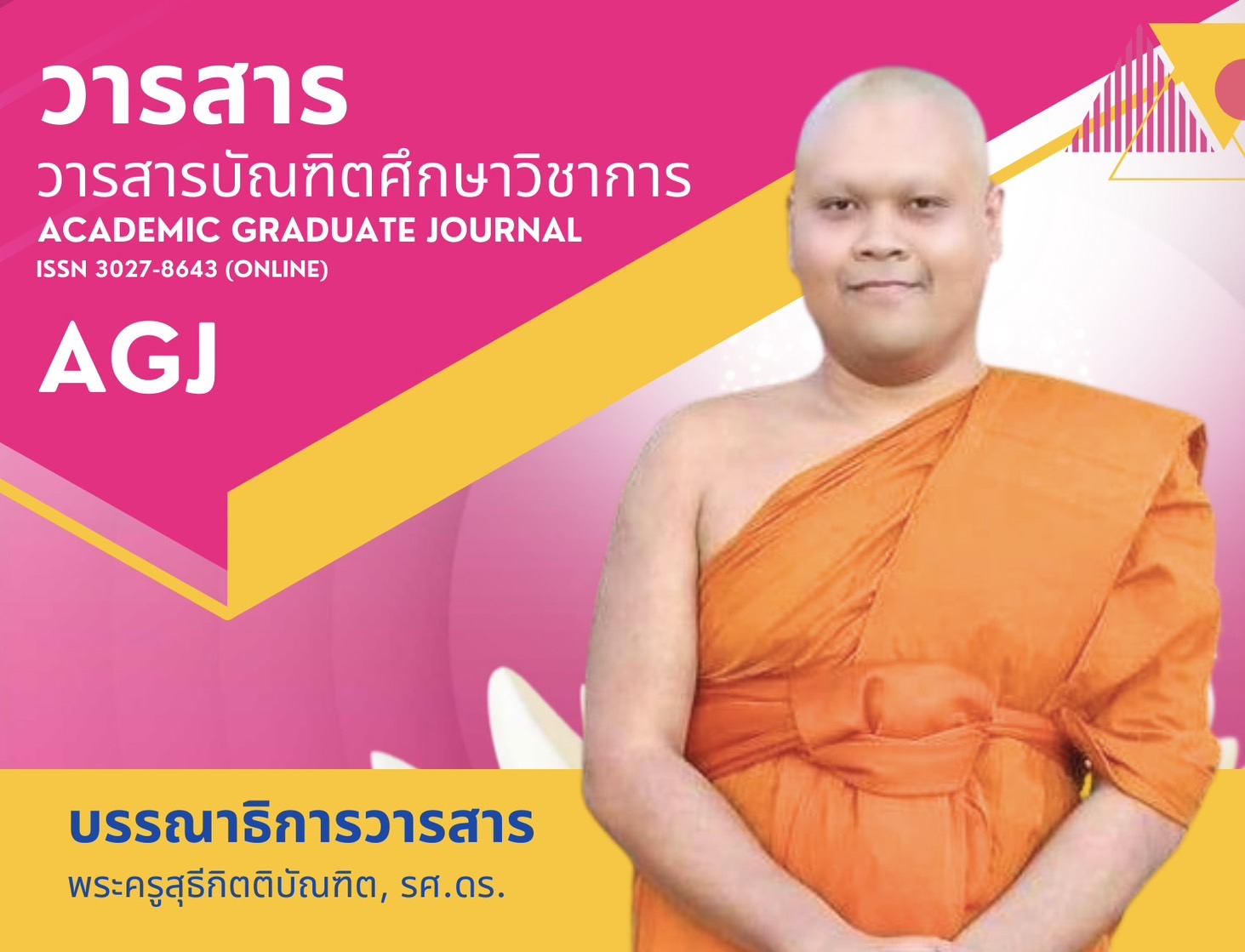BUDDHIST ROLE IN NATURAL DISASTER CRISIS: AN UNDERSTANDING OF BUDDHIST INTEGRATION APPROACH
Keywords:
Role, Buddhism, Natural Disaster, Buddhist IntegrationAbstract
This article aims to study the principles of Buddhist integration and their application in all stages of disaster relief operations, both at the organizational and individual levels, to provide a conceptual approach to facing disasters. The framework of Buddhist integration involves analyzing and understanding the operational environment of organizations and personnel through the principles and values of Buddhism, thereby fostering a sustainable society and cooperation. Human beings often face losses resulting from the impacts of natural disasters, which affect both the mind and body. Developing the mind is crucial. Understanding the Dhamma, the teachings of Buddhism, plays an essential role in cultivating wisdom through practice. This can be done even while working by instilling a collective consciousness according to Buddhist principles. The benefit of applying Buddhist principles can be realised by adopting a comprehensive approach that includes international organisations and local coordination using the Middle Path (Majjhima Patipada), developing a systematic thinking process through critical reflection (Yoniso Manasikara), and establishing appropriate behavioural patterns to facilitate cooperation based on the four principles of social integration (Sangahavatthu 4). The application of Buddhist principles by the Royal Irrigation Department, such as the Seven Qualities of a Good Man (Sappurisa-dhamma 7), integrated with management principles, aims to solve problems related to water management effectively, thereby addressing the crisis caused by natural disasters: floods. Critical approaches include developing personnel and organisational commitment and attention to duty, resulting in crisis management that aligns with the needs of the public. On an individual level, understanding the Four Noble Truths (Ariya-Sacca 4) can be used to maintain health despite scarcity during natural disasters. Living life according to the principles of the Four Requisites (Patjai 4) can be integrated with Maslow’s Hierarchy of Needs, thereby addressing the needs of disaster victims effectively and providing timely assistance during emergencies. Even in times of natural disaster crises, the principles of Buddhism offer a valuable framework for understanding and meeting the needs of those affected.
References
กฤษณ ธาดาบดินทร และ พระมหาจีรวัฒน์ กนฺตวณฺโณ. (2565). อริยสัจกับการแก้ปัญหาในสังคมไทย. วารสารวิชาการสถาบันพัฒนาพระวิทยากร, 5(2), 249-260.
กลุ่มวิชาพุทธวิธีในการพัฒนานิสัย. (2558). ปัจจัย 4 กับวิถีชีวิตของฆราวาส แม่บทการฝึกอบรมในพระพุทธศาสนา. สืบค้น 1 พฤษภาคม 2567, จากhttps://kalyanamitra.org/th/article_detail.php?i= 10082.
ตวงเพชร สมศรี. (2558). ระบบการทำงานของบุคคลต้นแบบเชิงพุทธบูรณาการ. กรุงเทพฯ: มหาวิทยาลัยมหาจุฬาลงกรณราชวิทยาลัย.
นฤมล สมรรคเสวี. (2557). ภาวะวิกฤตจากภัยพิบัติทางธรรมชาติกับบทบาทพยาบาล, วารสารการพยาบาลจิตเวชและสุขภาพจิต, 28(2), 1-16.
พระครูไพศาลศีลวัฒน. (2565). รูปแบบการจัดการสภาพแวดล้อมและภาวะวิกฤตอุกทกภัยของชุมชนลุ่มน้ำเจ้าพระยา จังหวัดอ่างทอง (ดุษฎีนิพนธ์หลักสูตรปริญญาพุทธศาสตรดุษฎีบัณฑิต สาขาวิชาการพัฒนาสังคม). พระนครศรีอยุธยา: มหาวิทยาลัยมหาจุฬาลงกรณราชวิทยาลัย.
พระครูสารกิจประยุตฒ (2560), การประยุกต์ใช้หลักอริยสัจ 4 ในการแก้ไขปัญหาชีวิต. ธรรมทรรศน์, 17(2), 257-267.
พระธรรมโกศาจารย์ (พุทธทาสภิกขุ). (2558). พระธรรมเทศนา : วิธีการทำงาน ให้เป็นการปฏิบัติธรรม. สืบค้น 1 พฤษภาคม 2567, จาก http://www.trilakbooks.com/index.php?mo=1.
พระพรหมบัณฑิต (ประยูร ธมฺมจิตฺฺโต), (2564), พระพุทธศาสนากับการพัฒนาที่ยั่งยืน. กรุงเทพฯ: นิติธรรมการพิมพ์.
พระมหากฤษฎา กิตฺติโสภโณ. (2563). ระเบียบวิธีวิจัยทางการจัดการเชิงพุทธ Research Methodology in Buddhist Management. พระนครศรีอยุธยา: สำนักพิมพ์มหาวิทยาลัยมหาจุฬาลงกรณราชวิทยาลัย.
มหาจุฬาลงกรณราชวิทยาลัย. (2539). พระไตรปิฎกฉบับภาษาไทย ฉบับมหาจุฬาลงกรณราชวิทยาลัย.กรุงเทพฯ: โรงพิมพ์มหาจุฬาลงกรณราชวิทยาลัย.
อดิเทพ ภิญญาเกษม. (2565). การพัฒนาเทคโนโลยีสารสนเทศในการบริหารจัดการทรัพยากรน้ำของกรมชลประทานโดยการประยุกต์ใช้หลักพุทธธรรม (ดุษฎีนิพนธ์หลักสูตรปริญญาปรัชญาดุษฎีบัณฑิต สาขาวิชารัฐประศาสนศาสตร์). พระนครศรีอยุธยา: มหาวิทยาลัยมหาจุฬาลงกรณราชวิทยาลัย.
Maslow., A. H. (1943). A theory of human motivation. Psychological Review, 50(4), 370–396.
Formoso-Suáre, A. M., et al. (2022). The Impact of Religion and Social Support on Self-Reported Happiness in Latin American Immigrants in Spain. Religions, 13(122), 1-14.
Davis, K. (1957). Human Relations in Business. New York: McGraw-Hill Book Company, INC.







